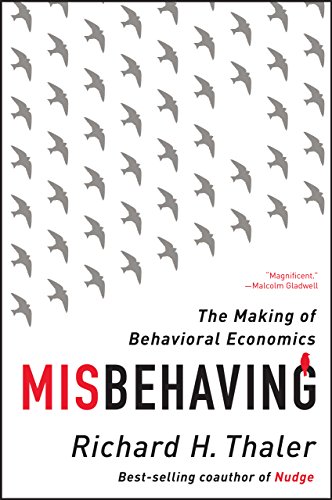Misbehaving: The Making of Behavioral Economics by Richard H. Thaler Link to heading
Summary Link to heading
“Misbehaving: The Making of Behavioral Economics” is a comprehensive exploration of the field of behavioral economics, written by Richard H. Thaler, a prominent figure in the discipline. The book chronicles Thaler’s intellectual journey and the development of behavioral economics, which integrates insights from psychology with traditional economic theories to better understand human decision-making. Thaler provides anecdotes and empirical research to demonstrate how real-world human behavior often deviates from classical economic models that assume individuals are consistently rational and self-interested. The narrative highlights landmark experiments and collaborations with other scholars like Daniel Kahneman and Amos Tversky, emphasizing how behavioral economics challenges conventional economic paradigms and influences policy-making.
Review Link to heading
Thaler’s “Misbehaving” has been widely regarded as both insightful and entertaining, successfully blending academic rigor with accessible storytelling. The book’s strength lies in Thaler’s ability to convey complex economic concepts through relatable examples and a humorous tone. Readers can gain a deeper understanding of the limitations of traditional economic models while appreciating the practical applications of behavioral insights. A notable critique, however, could be that the book occasionally becomes anecdotal, with less emphasis on statistical analyses or alternative perspectives within economics. Nonetheless, Thaler’s contributions to behavioral economics are undeniable, making “Misbehaving” a significant addition to economic literature.
Key Takeaways Link to heading
- Human Behavior is Often Irrational: Traditional economic models assume rational behavior, but Thaler illustrates that humans frequently disobey these assumptions, leading to “misbehavior.”
- Nudges and Policy: By understanding behavioral tendencies, policymakers can design interventions, or “nudges,” to guide better decision-making without restricting freedom of choice.
- Loss Aversion: People tend to fear losses more than they value gains, which can lead to inconsistent decision-making patterns.
- Mental Accounting: Individuals categorize and treat money differently based on subjective criteria, affecting spending and investment behavior.
- Challenges to Mainstream Economics: Behavioral economics provides a paradigm shift by incorporating psychological insights, thereby posing challenges to traditional economic assumptions.
Recommendation Link to heading
“Misbehaving: The Making of Behavioral Economics” is recommended for anyone interested in economics, psychology, or policy-making. The book is particularly beneficial for students, researchers, and professionals in these fields, as well as general readers eager to understand how economic theories apply to everyday life. Richard Thaler’s engaging writing style ensures that even those unfamiliar with economics can grasp the concepts and appreciate the practical implications of behavioral economics.
